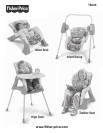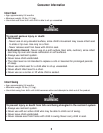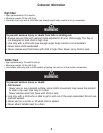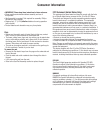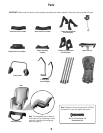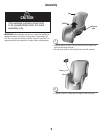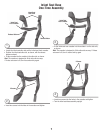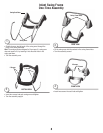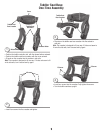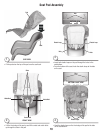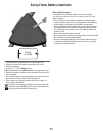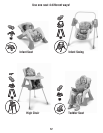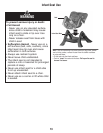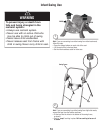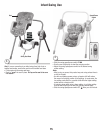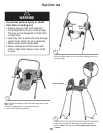4
• IMPORTANT! Please keep these instructions for future reference.
• Please read these instructions before assembly and use of
this product.
• Adult assembly is required. Tool required for assembly: Phillips
screwdriver (not included).
• Requires four “C” (LR14) alkaline batteries for swing operation
(not included).
• Product features and decoration may vary from photos.
Consumer Information
Care
• Before use, thoroughly wash all parts (the tray) that may contact
food. The tray is not microwave or dishwasher safe.
• The bases, swing frame, legs, seat, toy and tray can be wiped clean
using a mild cleaning solution and a damp cloth. Do not immerse
the swing frame. Do not use bleach. Do not use harsh or abrasive
cleaners. Rinse clean with water to remove residue.
• The pad can be machine washed in cold water on the gentle cycle.
Do not use bleach. Tumble dry on low heat.
To remove the pad:
• Remove the four elastic loops from the pegs on the underside and
back of the seat.
• Push the waist and crotch restraints down through the slots in
the pad.
• Lift to remove the pad from the seat.
• Refer to the Seat Pad Assembly section to replace the pad.
ICES-003
This Class B digital apparatus complies with Canadian ICES-003.
Operation is subject to the following two conditions: (1) this device
may not cause harmful interference and (2) this device must accept
any interference received, including interference that may cause
undesired operation.
NMB-003
Cet appareil numérique de la classe B est conforme à la norme
NMB-003 du Canada.L’utilisation de ce dispositif est autorisée seule-
ment aux conditions suivantes : (1) il ne doit pas produire de brouillage
et (2) l’utilisateur du dispositif doit être prêt à accepter tout brouillage
radioélectrique reçu, même si ce brouillage est susceptible de
compromettre le fonctionnement du dispositif.
FCC Statement (United States Only)
This equipment has been tested and found to comply with the limits
for a Class B digital device, pursuant to Part 15 of the FCC Rules.
These limits are designed to provide reasonable protection against
harmful interference in a residential installation. This equipment
generates, uses and can radiate radio frequency energy and, if not
installed and used in accordance with the instructions, may cause
harmful interference to radio communications. However, there is no
guarantee that interference will not occur in a particular installation. If
this equipment does cause harmful interference to radio or television
reception, which can be determined by turning the equipment off and
on, the user is encouraged to try to correct the interference by one or
more of the following measures:
• Reorient or relocate the receiving antenna.
• Increase the separation between the equipment and receiver.
• Consult the dealer or an experienced radio/TV technician for help.
Note: Changes or modifications not expressly approved by the manu-
facturer responsible for compliance could void the user’s authority to
operate the equipment.
This device complies with Part 15 of the FCC Rules. Operation is
subject to the following two conditions: (1) this device may not cause
harmful interference and (2) this device must accept any interference
received, including interference that may cause undesired operation.



